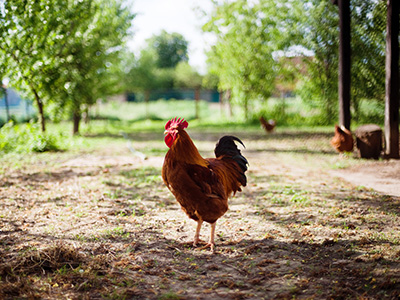Sustainable Chicken
The word sustainable is defined as “a method of harvesting or using a resource that replaces and renews the resource, rather than depleting or permanently damaging it”. In agriculture, sustainability is achieved balancing ecological farming practices and economic profit with community support. Sustainable poultry farming integrates birds with the farm and land in a way that, with proper management, promotes the health and well-being of the birds, the land, the farm, and the farmer. Pastured chickens offer many benefits to the sustainable farm, supplying eggs and/or meat, enhancing soil fertility, and controlling weeds and insects. Advantages of raising poultry on pasture include:
- Improved farm soil fertility and disease prevention. Poultry enhance soil fertility by working their manure into the soil, and they help manage crop pests by grazing on weeds and insects. Also, birds can be rotated into pasture following other livestock (such as cattle) to control fly and parasite problems.
- Increased farm profitability with minimal capital investment. Pastured poultry enhance and diversify the farm operation, providing several income options with minimal investment for housing, equipment, and maintenance.
- Better health for the chickens and consumers who eat their products. Pastured birds eat grasses and legumes that contain Vitamin A and omega-3 fatty acids, nutrients that are known to reduce cholesterol. Pastured birds also have more access to adequate space, fresh air, sunshine, and exercise, and thus maintain better physical health than confined birds (pastured birds require no hormones or antibiotics unless faced with acute illness). With more exercise, birds maintain a lower fat content, which is healthier for the bird and the consumer.

